Organisational Behaviour Report: Analysis of 4com plc's Performance
VerifiedAdded on 2020/10/22
|15
|4903
|91
Report
AI Summary
This report provides a comprehensive analysis of organisational behaviour within 4com plc, a telecommunications company. It begins by exploring the influence of organisational culture, power dynamics, and politics on employee performance. The report then delves into content and process theories of motivation, including Maslow's Hierarchy of Needs, Herzberg's two-factor theory, and Vroom's expectancy theory, examining how these theories can be applied to enhance employee motivation and productivity. Furthermore, the report contrasts effective and ineffective teams, highlighting the characteristics that contribute to successful teamwork. Finally, it examines key concepts and philosophies of organisational behaviour, offering insights into how these principles can be leveraged to improve overall organisational performance. The report concludes with recommendations for 4com plc to optimize its organisational behaviour practices and foster a positive and productive work environment.
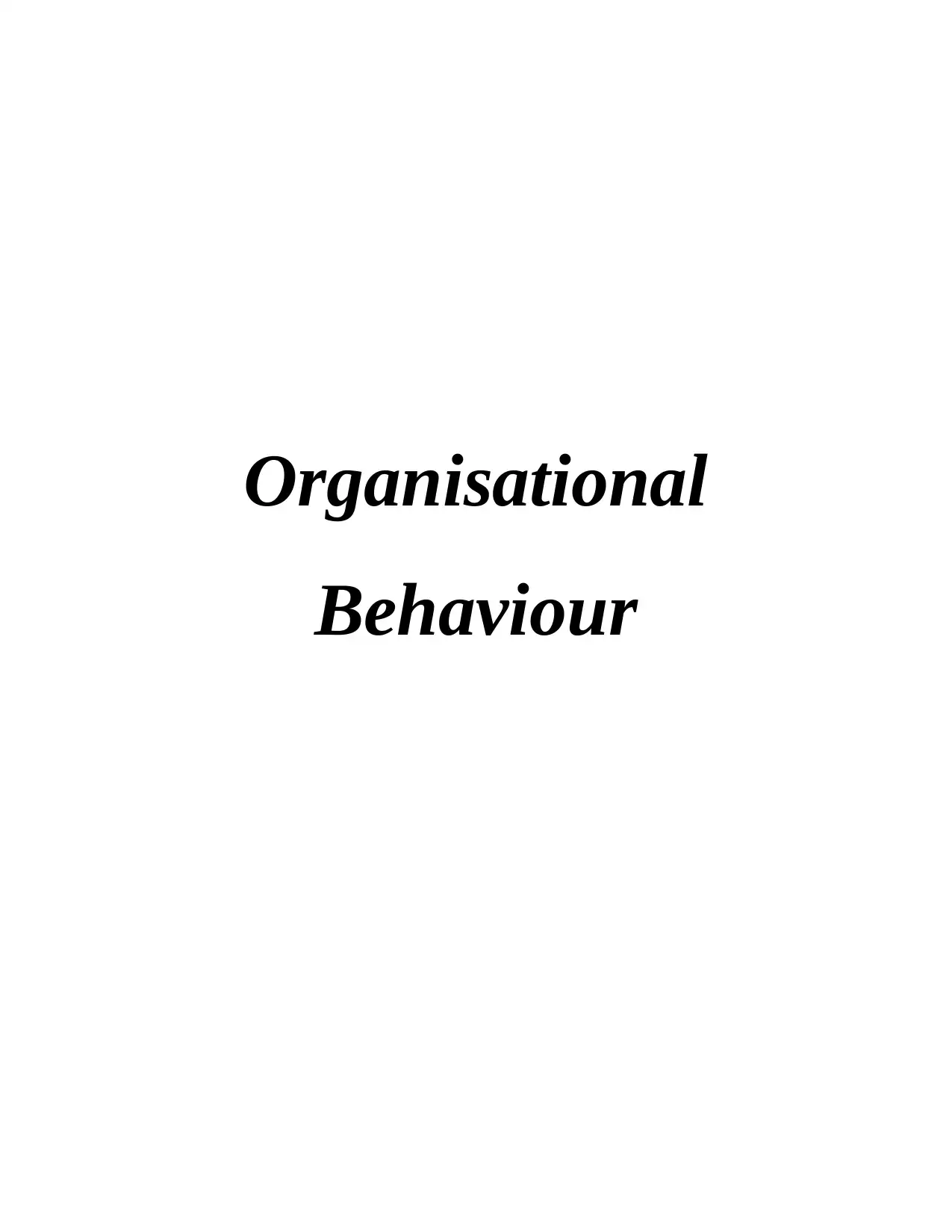
Organisational
Behaviour
Behaviour
Paraphrase This Document
Need a fresh take? Get an instant paraphrase of this document with our AI Paraphraser
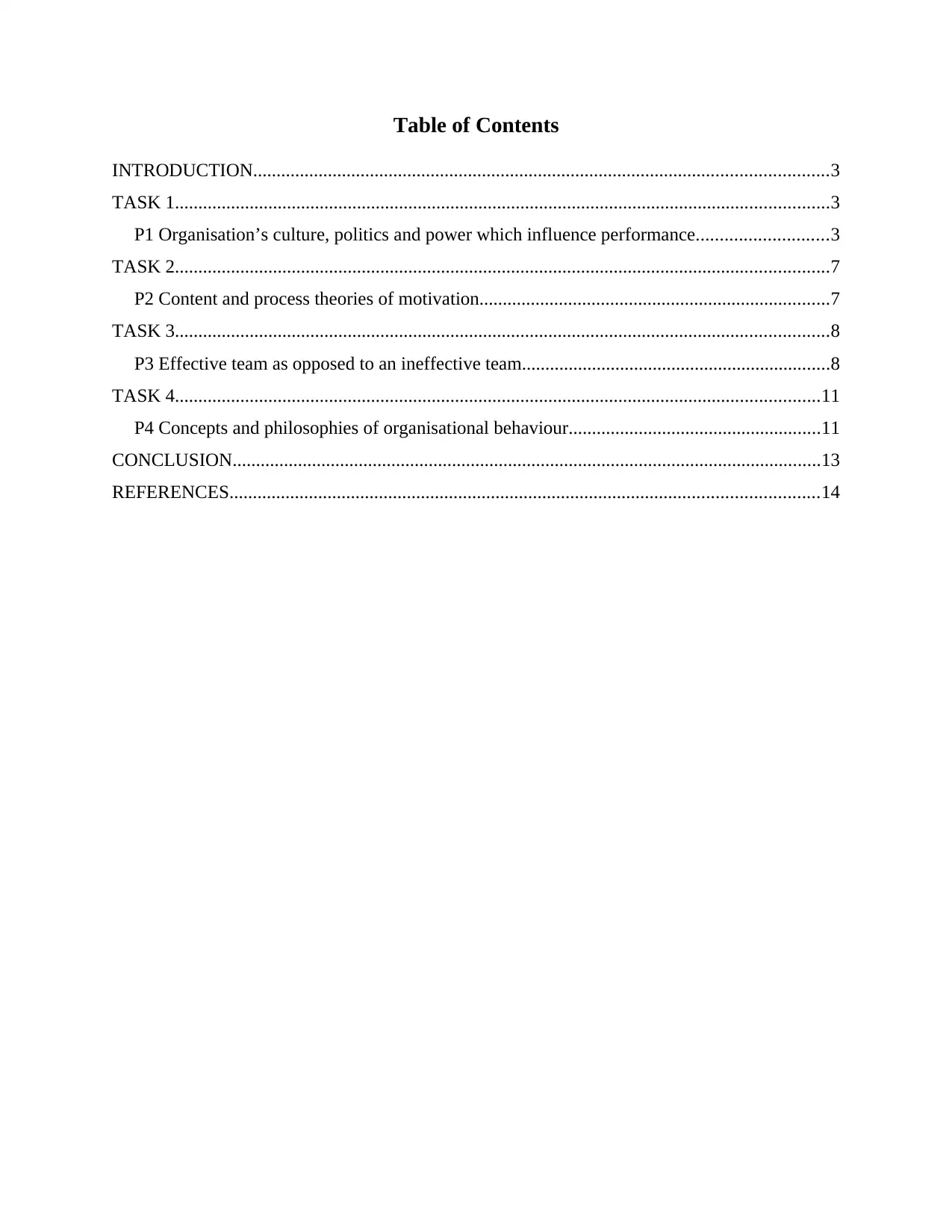
Table of Contents
INTRODUCTION...........................................................................................................................3
TASK 1............................................................................................................................................3
P1 Organisation’s culture, politics and power which influence performance............................3
TASK 2............................................................................................................................................7
P2 Content and process theories of motivation...........................................................................7
TASK 3............................................................................................................................................8
P3 Effective team as opposed to an ineffective team..................................................................8
TASK 4..........................................................................................................................................11
P4 Concepts and philosophies of organisational behaviour......................................................11
CONCLUSION..............................................................................................................................13
REFERENCES..............................................................................................................................14
INTRODUCTION...........................................................................................................................3
TASK 1............................................................................................................................................3
P1 Organisation’s culture, politics and power which influence performance............................3
TASK 2............................................................................................................................................7
P2 Content and process theories of motivation...........................................................................7
TASK 3............................................................................................................................................8
P3 Effective team as opposed to an ineffective team..................................................................8
TASK 4..........................................................................................................................................11
P4 Concepts and philosophies of organisational behaviour......................................................11
CONCLUSION..............................................................................................................................13
REFERENCES..............................................................................................................................14
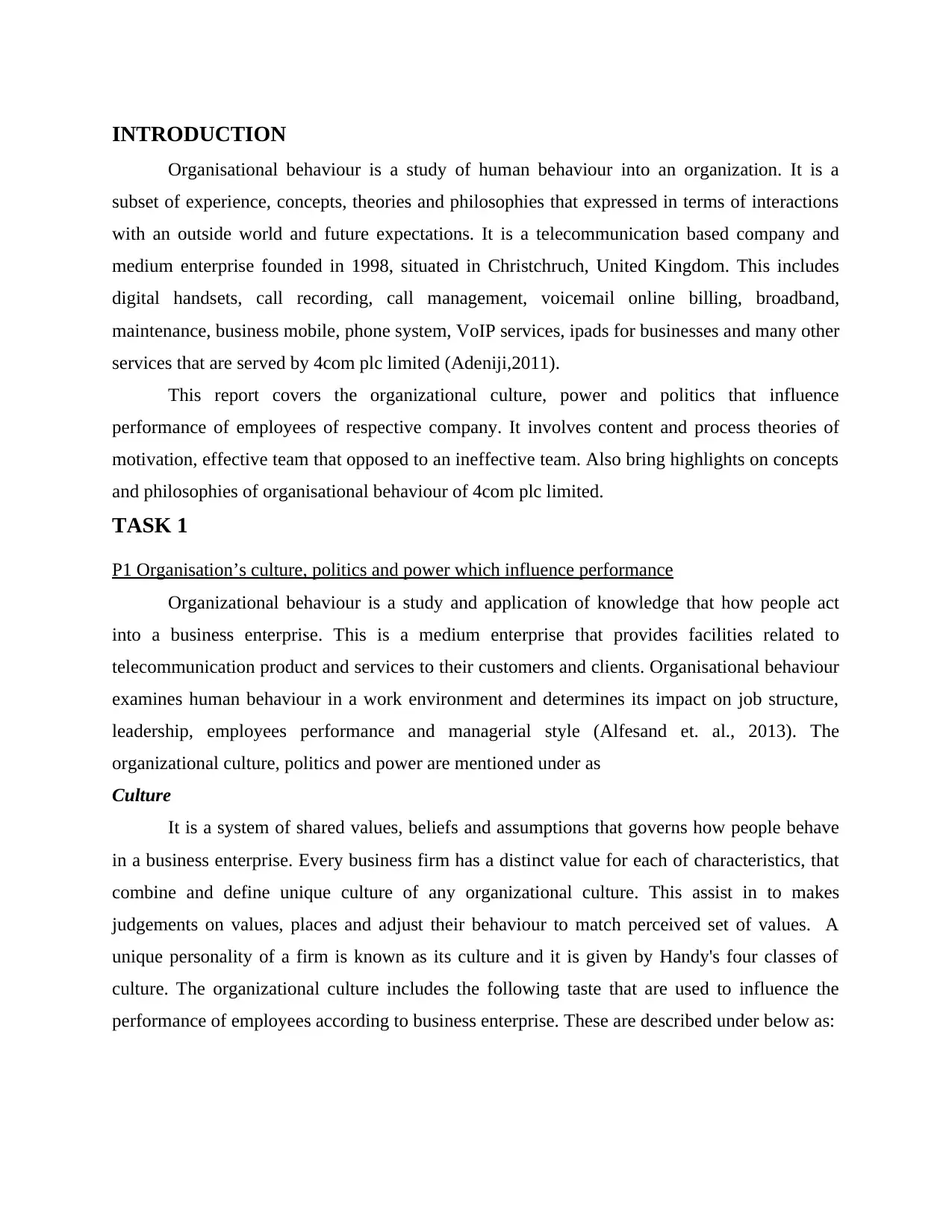
INTRODUCTION
Organisational behaviour is a study of human behaviour into an organization. It is a
subset of experience, concepts, theories and philosophies that expressed in terms of interactions
with an outside world and future expectations. It is a telecommunication based company and
medium enterprise founded in 1998, situated in Christchruch, United Kingdom. This includes
digital handsets, call recording, call management, voicemail online billing, broadband,
maintenance, business mobile, phone system, VoIP services, ipads for businesses and many other
services that are served by 4com plc limited (Adeniji,2011).
This report covers the organizational culture, power and politics that influence
performance of employees of respective company. It involves content and process theories of
motivation, effective team that opposed to an ineffective team. Also bring highlights on concepts
and philosophies of organisational behaviour of 4com plc limited.
TASK 1
P1 Organisation’s culture, politics and power which influence performance
Organizational behaviour is a study and application of knowledge that how people act
into a business enterprise. This is a medium enterprise that provides facilities related to
telecommunication product and services to their customers and clients. Organisational behaviour
examines human behaviour in a work environment and determines its impact on job structure,
leadership, employees performance and managerial style (Alfesand et. al., 2013). The
organizational culture, politics and power are mentioned under as
Culture
It is a system of shared values, beliefs and assumptions that governs how people behave
in a business enterprise. Every business firm has a distinct value for each of characteristics, that
combine and define unique culture of any organizational culture. This assist in to makes
judgements on values, places and adjust their behaviour to match perceived set of values. A
unique personality of a firm is known as its culture and it is given by Handy's four classes of
culture. The organizational culture includes the following taste that are used to influence the
performance of employees according to business enterprise. These are described under below as:
Organisational behaviour is a study of human behaviour into an organization. It is a
subset of experience, concepts, theories and philosophies that expressed in terms of interactions
with an outside world and future expectations. It is a telecommunication based company and
medium enterprise founded in 1998, situated in Christchruch, United Kingdom. This includes
digital handsets, call recording, call management, voicemail online billing, broadband,
maintenance, business mobile, phone system, VoIP services, ipads for businesses and many other
services that are served by 4com plc limited (Adeniji,2011).
This report covers the organizational culture, power and politics that influence
performance of employees of respective company. It involves content and process theories of
motivation, effective team that opposed to an ineffective team. Also bring highlights on concepts
and philosophies of organisational behaviour of 4com plc limited.
TASK 1
P1 Organisation’s culture, politics and power which influence performance
Organizational behaviour is a study and application of knowledge that how people act
into a business enterprise. This is a medium enterprise that provides facilities related to
telecommunication product and services to their customers and clients. Organisational behaviour
examines human behaviour in a work environment and determines its impact on job structure,
leadership, employees performance and managerial style (Alfesand et. al., 2013). The
organizational culture, politics and power are mentioned under as
Culture
It is a system of shared values, beliefs and assumptions that governs how people behave
in a business enterprise. Every business firm has a distinct value for each of characteristics, that
combine and define unique culture of any organizational culture. This assist in to makes
judgements on values, places and adjust their behaviour to match perceived set of values. A
unique personality of a firm is known as its culture and it is given by Handy's four classes of
culture. The organizational culture includes the following taste that are used to influence the
performance of employees according to business enterprise. These are described under below as:
⊘ This is a preview!⊘
Do you want full access?
Subscribe today to unlock all pages.

Trusted by 1+ million students worldwide
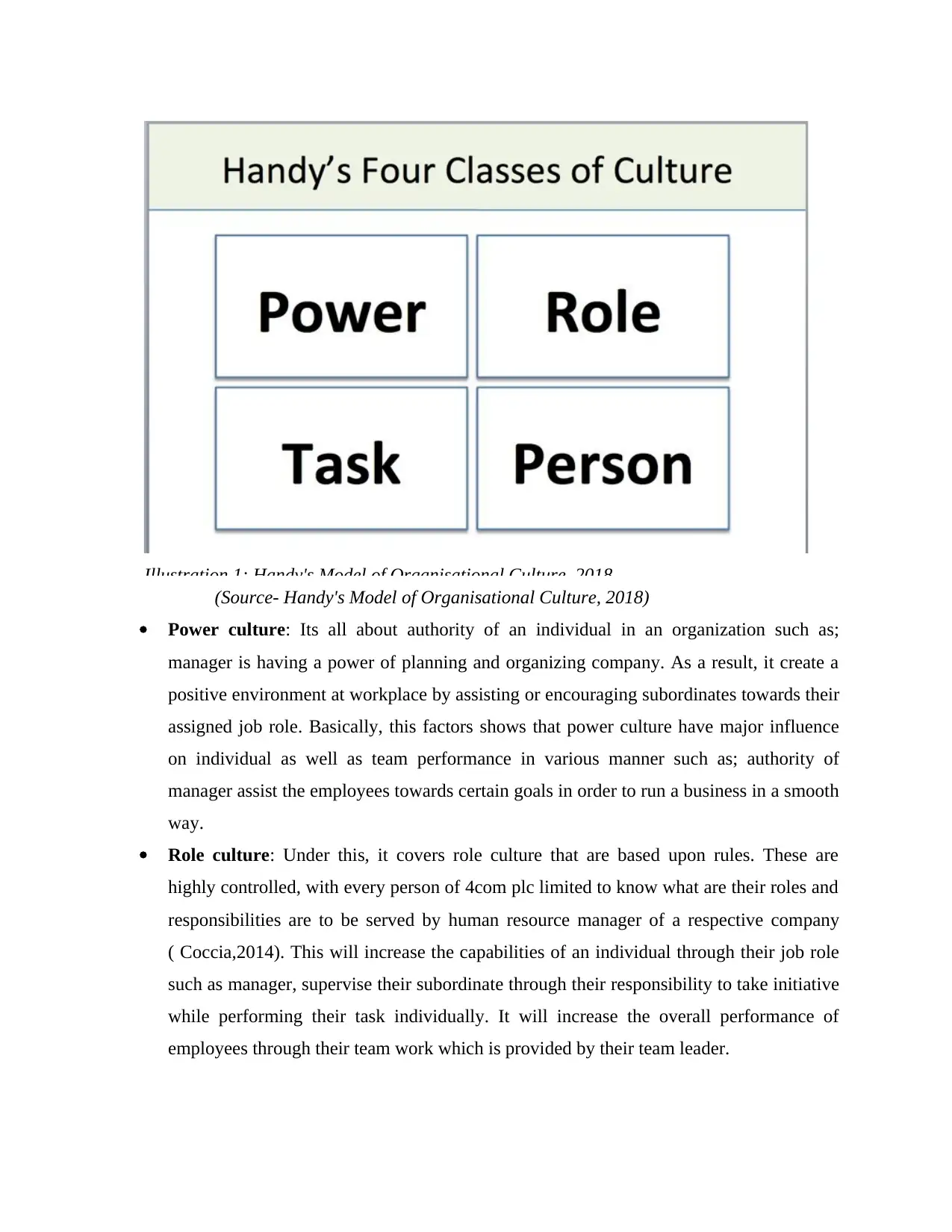
(Source- Handy's Model of Organisational Culture, 2018)
Power culture: Its all about authority of an individual in an organization such as;
manager is having a power of planning and organizing company. As a result, it create a
positive environment at workplace by assisting or encouraging subordinates towards their
assigned job role. Basically, this factors shows that power culture have major influence
on individual as well as team performance in various manner such as; authority of
manager assist the employees towards certain goals in order to run a business in a smooth
way.
Role culture: Under this, it covers role culture that are based upon rules. These are
highly controlled, with every person of 4com plc limited to know what are their roles and
responsibilities are to be served by human resource manager of a respective company
( Coccia,2014). This will increase the capabilities of an individual through their job role
such as manager, supervise their subordinate through their responsibility to take initiative
while performing their task individually. It will increase the overall performance of
employees through their team work which is provided by their team leader.
Illustration 1: Handy's Model of Organisational Culture. 2018.
Power culture: Its all about authority of an individual in an organization such as;
manager is having a power of planning and organizing company. As a result, it create a
positive environment at workplace by assisting or encouraging subordinates towards their
assigned job role. Basically, this factors shows that power culture have major influence
on individual as well as team performance in various manner such as; authority of
manager assist the employees towards certain goals in order to run a business in a smooth
way.
Role culture: Under this, it covers role culture that are based upon rules. These are
highly controlled, with every person of 4com plc limited to know what are their roles and
responsibilities are to be served by human resource manager of a respective company
( Coccia,2014). This will increase the capabilities of an individual through their job role
such as manager, supervise their subordinate through their responsibility to take initiative
while performing their task individually. It will increase the overall performance of
employees through their team work which is provided by their team leader.
Illustration 1: Handy's Model of Organisational Culture. 2018.
Paraphrase This Document
Need a fresh take? Get an instant paraphrase of this document with our AI Paraphraser
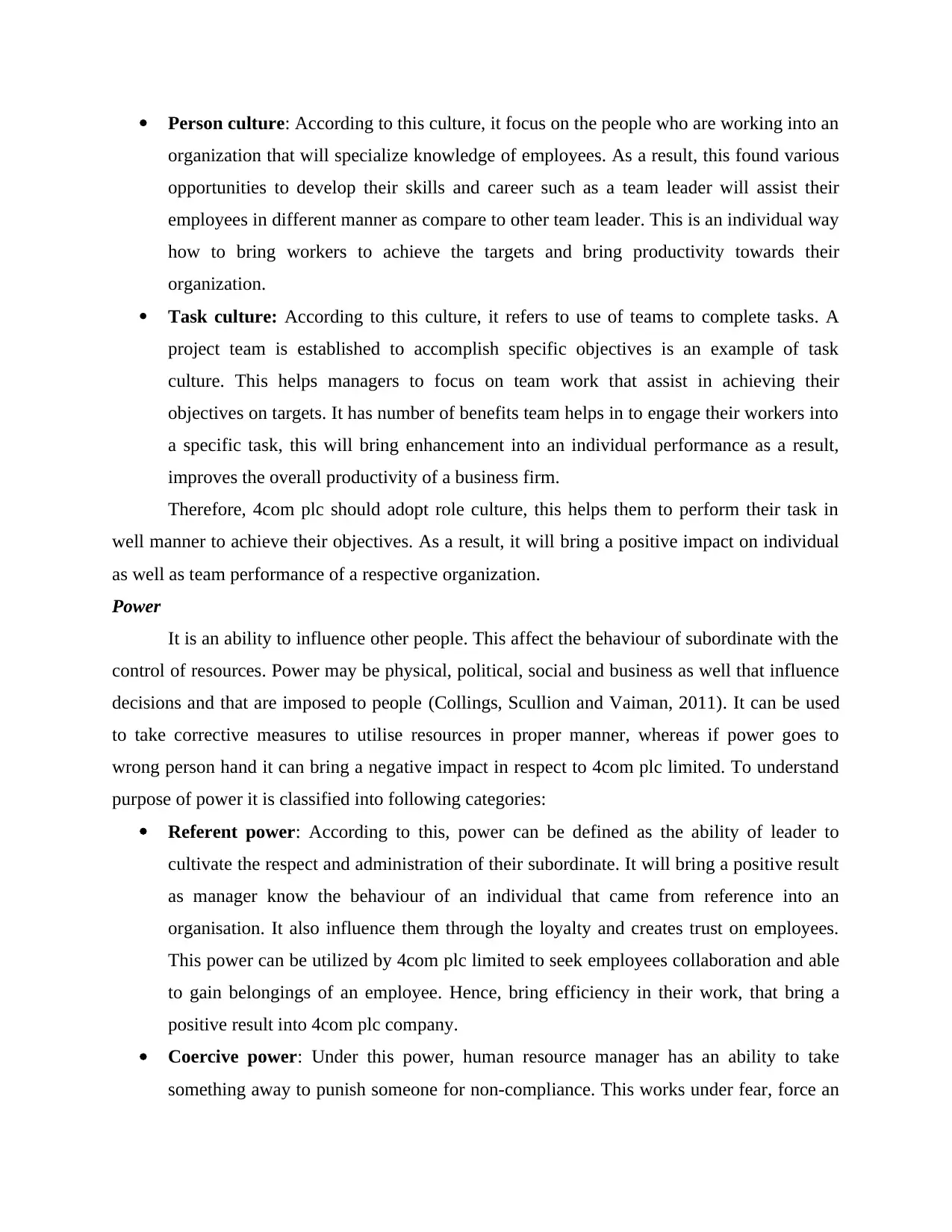
Person culture: According to this culture, it focus on the people who are working into an
organization that will specialize knowledge of employees. As a result, this found various
opportunities to develop their skills and career such as a team leader will assist their
employees in different manner as compare to other team leader. This is an individual way
how to bring workers to achieve the targets and bring productivity towards their
organization.
Task culture: According to this culture, it refers to use of teams to complete tasks. A
project team is established to accomplish specific objectives is an example of task
culture. This helps managers to focus on team work that assist in achieving their
objectives on targets. It has number of benefits team helps in to engage their workers into
a specific task, this will bring enhancement into an individual performance as a result,
improves the overall productivity of a business firm.
Therefore, 4com plc should adopt role culture, this helps them to perform their task in
well manner to achieve their objectives. As a result, it will bring a positive impact on individual
as well as team performance of a respective organization.
Power
It is an ability to influence other people. This affect the behaviour of subordinate with the
control of resources. Power may be physical, political, social and business as well that influence
decisions and that are imposed to people (Collings, Scullion and Vaiman, 2011). It can be used
to take corrective measures to utilise resources in proper manner, whereas if power goes to
wrong person hand it can bring a negative impact in respect to 4com plc limited. To understand
purpose of power it is classified into following categories:
Referent power: According to this, power can be defined as the ability of leader to
cultivate the respect and administration of their subordinate. It will bring a positive result
as manager know the behaviour of an individual that came from reference into an
organisation. It also influence them through the loyalty and creates trust on employees.
This power can be utilized by 4com plc limited to seek employees collaboration and able
to gain belongings of an employee. Hence, bring efficiency in their work, that bring a
positive result into 4com plc company.
Coercive power: Under this power, human resource manager has an ability to take
something away to punish someone for non-compliance. This works under fear, force an
organization that will specialize knowledge of employees. As a result, this found various
opportunities to develop their skills and career such as a team leader will assist their
employees in different manner as compare to other team leader. This is an individual way
how to bring workers to achieve the targets and bring productivity towards their
organization.
Task culture: According to this culture, it refers to use of teams to complete tasks. A
project team is established to accomplish specific objectives is an example of task
culture. This helps managers to focus on team work that assist in achieving their
objectives on targets. It has number of benefits team helps in to engage their workers into
a specific task, this will bring enhancement into an individual performance as a result,
improves the overall productivity of a business firm.
Therefore, 4com plc should adopt role culture, this helps them to perform their task in
well manner to achieve their objectives. As a result, it will bring a positive impact on individual
as well as team performance of a respective organization.
Power
It is an ability to influence other people. This affect the behaviour of subordinate with the
control of resources. Power may be physical, political, social and business as well that influence
decisions and that are imposed to people (Collings, Scullion and Vaiman, 2011). It can be used
to take corrective measures to utilise resources in proper manner, whereas if power goes to
wrong person hand it can bring a negative impact in respect to 4com plc limited. To understand
purpose of power it is classified into following categories:
Referent power: According to this, power can be defined as the ability of leader to
cultivate the respect and administration of their subordinate. It will bring a positive result
as manager know the behaviour of an individual that came from reference into an
organisation. It also influence them through the loyalty and creates trust on employees.
This power can be utilized by 4com plc limited to seek employees collaboration and able
to gain belongings of an employee. Hence, bring efficiency in their work, that bring a
positive result into 4com plc company.
Coercive power: Under this power, human resource manager has an ability to take
something away to punish someone for non-compliance. This works under fear, force an
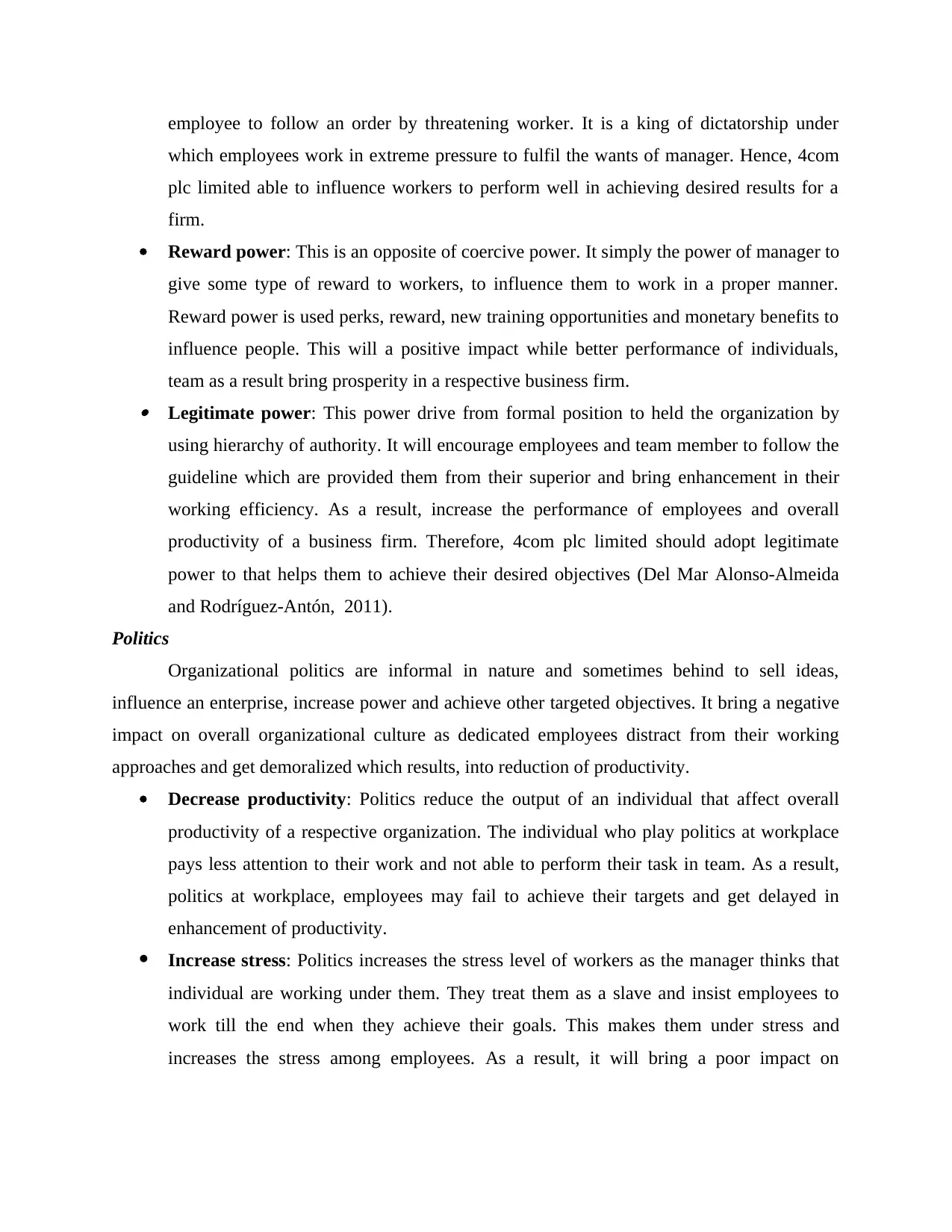
employee to follow an order by threatening worker. It is a king of dictatorship under
which employees work in extreme pressure to fulfil the wants of manager. Hence, 4com
plc limited able to influence workers to perform well in achieving desired results for a
firm.
Reward power: This is an opposite of coercive power. It simply the power of manager to
give some type of reward to workers, to influence them to work in a proper manner.
Reward power is used perks, reward, new training opportunities and monetary benefits to
influence people. This will a positive impact while better performance of individuals,
team as a result bring prosperity in a respective business firm. Legitimate power: This power drive from formal position to held the organization by
using hierarchy of authority. It will encourage employees and team member to follow the
guideline which are provided them from their superior and bring enhancement in their
working efficiency. As a result, increase the performance of employees and overall
productivity of a business firm. Therefore, 4com plc limited should adopt legitimate
power to that helps them to achieve their desired objectives (Del Mar Alonso-Almeida
and Rodríguez-Antón, 2011).
Politics
Organizational politics are informal in nature and sometimes behind to sell ideas,
influence an enterprise, increase power and achieve other targeted objectives. It bring a negative
impact on overall organizational culture as dedicated employees distract from their working
approaches and get demoralized which results, into reduction of productivity.
Decrease productivity: Politics reduce the output of an individual that affect overall
productivity of a respective organization. The individual who play politics at workplace
pays less attention to their work and not able to perform their task in team. As a result,
politics at workplace, employees may fail to achieve their targets and get delayed in
enhancement of productivity.
Increase stress: Politics increases the stress level of workers as the manager thinks that
individual are working under them. They treat them as a slave and insist employees to
work till the end when they achieve their goals. This makes them under stress and
increases the stress among employees. As a result, it will bring a poor impact on
which employees work in extreme pressure to fulfil the wants of manager. Hence, 4com
plc limited able to influence workers to perform well in achieving desired results for a
firm.
Reward power: This is an opposite of coercive power. It simply the power of manager to
give some type of reward to workers, to influence them to work in a proper manner.
Reward power is used perks, reward, new training opportunities and monetary benefits to
influence people. This will a positive impact while better performance of individuals,
team as a result bring prosperity in a respective business firm. Legitimate power: This power drive from formal position to held the organization by
using hierarchy of authority. It will encourage employees and team member to follow the
guideline which are provided them from their superior and bring enhancement in their
working efficiency. As a result, increase the performance of employees and overall
productivity of a business firm. Therefore, 4com plc limited should adopt legitimate
power to that helps them to achieve their desired objectives (Del Mar Alonso-Almeida
and Rodríguez-Antón, 2011).
Politics
Organizational politics are informal in nature and sometimes behind to sell ideas,
influence an enterprise, increase power and achieve other targeted objectives. It bring a negative
impact on overall organizational culture as dedicated employees distract from their working
approaches and get demoralized which results, into reduction of productivity.
Decrease productivity: Politics reduce the output of an individual that affect overall
productivity of a respective organization. The individual who play politics at workplace
pays less attention to their work and not able to perform their task in team. As a result,
politics at workplace, employees may fail to achieve their targets and get delayed in
enhancement of productivity.
Increase stress: Politics increases the stress level of workers as the manager thinks that
individual are working under them. They treat them as a slave and insist employees to
work till the end when they achieve their goals. This makes them under stress and
increases the stress among employees. As a result, it will bring a poor impact on
⊘ This is a preview!⊘
Do you want full access?
Subscribe today to unlock all pages.

Trusted by 1+ million students worldwide
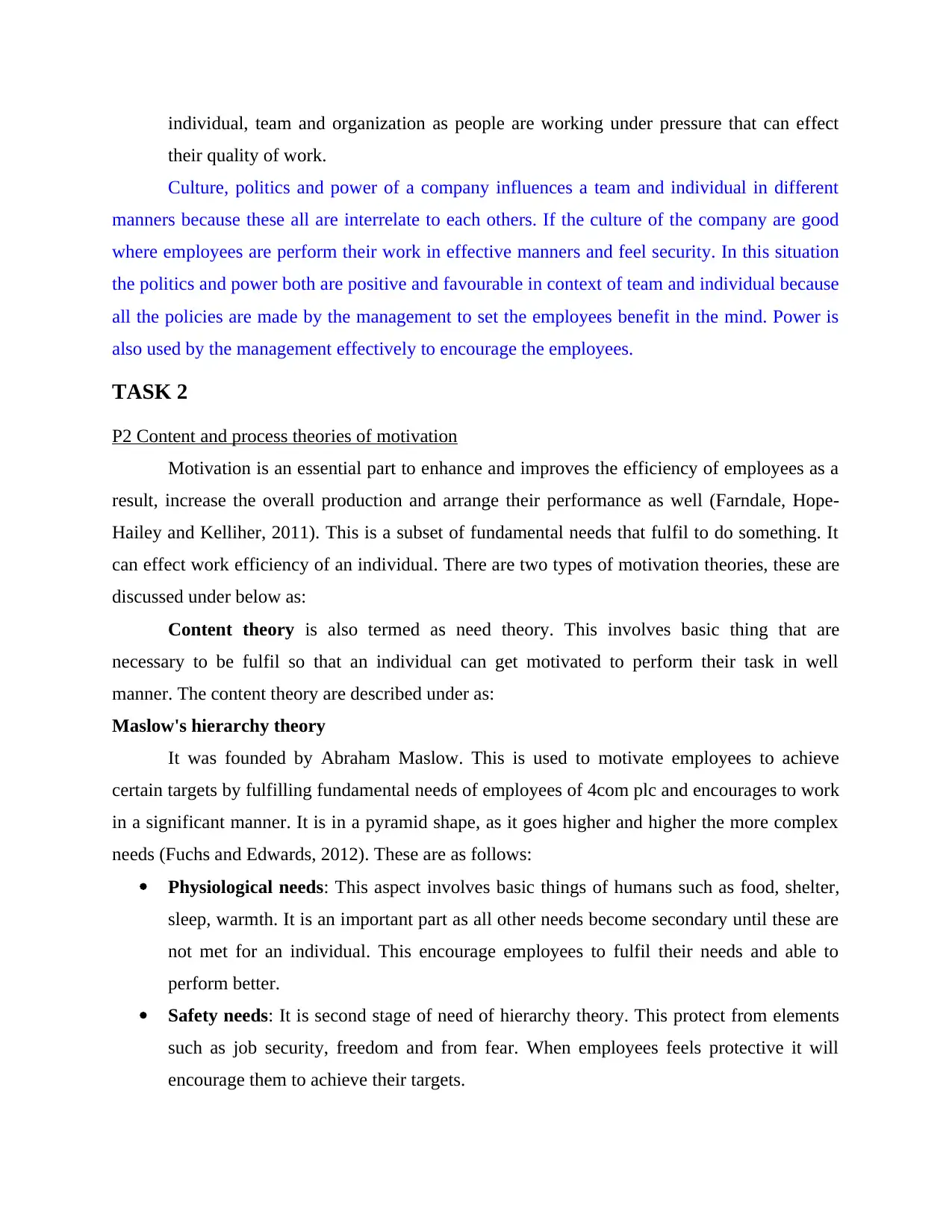
individual, team and organization as people are working under pressure that can effect
their quality of work.
Culture, politics and power of a company influences a team and individual in different
manners because these all are interrelate to each others. If the culture of the company are good
where employees are perform their work in effective manners and feel security. In this situation
the politics and power both are positive and favourable in context of team and individual because
all the policies are made by the management to set the employees benefit in the mind. Power is
also used by the management effectively to encourage the employees.
TASK 2
P2 Content and process theories of motivation
Motivation is an essential part to enhance and improves the efficiency of employees as a
result, increase the overall production and arrange their performance as well (Farndale, Hope-
Hailey and Kelliher, 2011). This is a subset of fundamental needs that fulfil to do something. It
can effect work efficiency of an individual. There are two types of motivation theories, these are
discussed under below as:
Content theory is also termed as need theory. This involves basic thing that are
necessary to be fulfil so that an individual can get motivated to perform their task in well
manner. The content theory are described under as:
Maslow's hierarchy theory
It was founded by Abraham Maslow. This is used to motivate employees to achieve
certain targets by fulfilling fundamental needs of employees of 4com plc and encourages to work
in a significant manner. It is in a pyramid shape, as it goes higher and higher the more complex
needs (Fuchs and Edwards, 2012). These are as follows:
Physiological needs: This aspect involves basic things of humans such as food, shelter,
sleep, warmth. It is an important part as all other needs become secondary until these are
not met for an individual. This encourage employees to fulfil their needs and able to
perform better.
Safety needs: It is second stage of need of hierarchy theory. This protect from elements
such as job security, freedom and from fear. When employees feels protective it will
encourage them to achieve their targets.
their quality of work.
Culture, politics and power of a company influences a team and individual in different
manners because these all are interrelate to each others. If the culture of the company are good
where employees are perform their work in effective manners and feel security. In this situation
the politics and power both are positive and favourable in context of team and individual because
all the policies are made by the management to set the employees benefit in the mind. Power is
also used by the management effectively to encourage the employees.
TASK 2
P2 Content and process theories of motivation
Motivation is an essential part to enhance and improves the efficiency of employees as a
result, increase the overall production and arrange their performance as well (Farndale, Hope-
Hailey and Kelliher, 2011). This is a subset of fundamental needs that fulfil to do something. It
can effect work efficiency of an individual. There are two types of motivation theories, these are
discussed under below as:
Content theory is also termed as need theory. This involves basic thing that are
necessary to be fulfil so that an individual can get motivated to perform their task in well
manner. The content theory are described under as:
Maslow's hierarchy theory
It was founded by Abraham Maslow. This is used to motivate employees to achieve
certain targets by fulfilling fundamental needs of employees of 4com plc and encourages to work
in a significant manner. It is in a pyramid shape, as it goes higher and higher the more complex
needs (Fuchs and Edwards, 2012). These are as follows:
Physiological needs: This aspect involves basic things of humans such as food, shelter,
sleep, warmth. It is an important part as all other needs become secondary until these are
not met for an individual. This encourage employees to fulfil their needs and able to
perform better.
Safety needs: It is second stage of need of hierarchy theory. This protect from elements
such as job security, freedom and from fear. When employees feels protective it will
encourage them to achieve their targets.
Paraphrase This Document
Need a fresh take? Get an instant paraphrase of this document with our AI Paraphraser
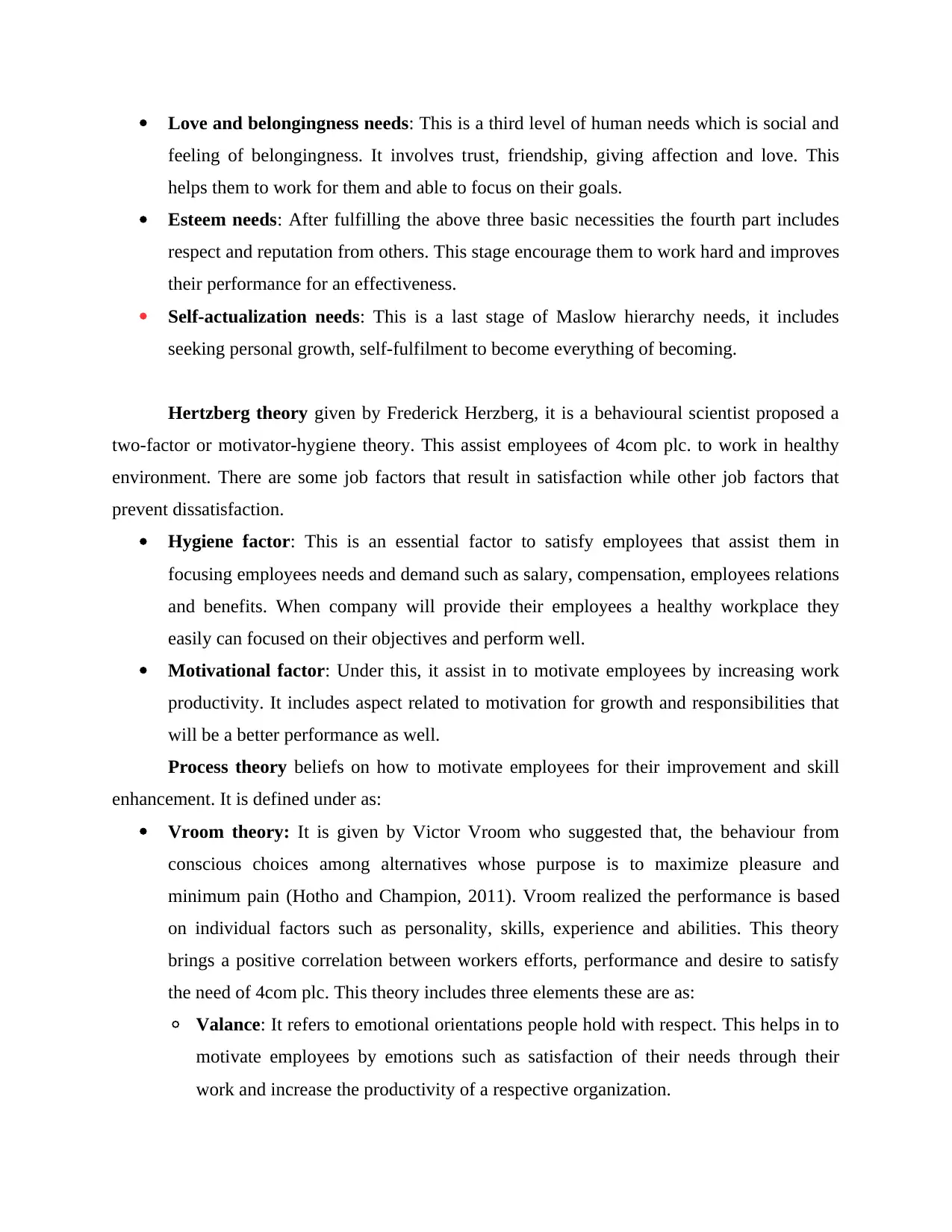
Love and belongingness needs: This is a third level of human needs which is social and
feeling of belongingness. It involves trust, friendship, giving affection and love. This
helps them to work for them and able to focus on their goals.
Esteem needs: After fulfilling the above three basic necessities the fourth part includes
respect and reputation from others. This stage encourage them to work hard and improves
their performance for an effectiveness.
Self-actualization needs: This is a last stage of Maslow hierarchy needs, it includes
seeking personal growth, self-fulfilment to become everything of becoming.
Hertzberg theory given by Frederick Herzberg, it is a behavioural scientist proposed a
two-factor or motivator-hygiene theory. This assist employees of 4com plc. to work in healthy
environment. There are some job factors that result in satisfaction while other job factors that
prevent dissatisfaction.
Hygiene factor: This is an essential factor to satisfy employees that assist them in
focusing employees needs and demand such as salary, compensation, employees relations
and benefits. When company will provide their employees a healthy workplace they
easily can focused on their objectives and perform well.
Motivational factor: Under this, it assist in to motivate employees by increasing work
productivity. It includes aspect related to motivation for growth and responsibilities that
will be a better performance as well.
Process theory beliefs on how to motivate employees for their improvement and skill
enhancement. It is defined under as:
Vroom theory: It is given by Victor Vroom who suggested that, the behaviour from
conscious choices among alternatives whose purpose is to maximize pleasure and
minimum pain (Hotho and Champion, 2011). Vroom realized the performance is based
on individual factors such as personality, skills, experience and abilities. This theory
brings a positive correlation between workers efforts, performance and desire to satisfy
the need of 4com plc. This theory includes three elements these are as:
◦ Valance: It refers to emotional orientations people hold with respect. This helps in to
motivate employees by emotions such as satisfaction of their needs through their
work and increase the productivity of a respective organization.
feeling of belongingness. It involves trust, friendship, giving affection and love. This
helps them to work for them and able to focus on their goals.
Esteem needs: After fulfilling the above three basic necessities the fourth part includes
respect and reputation from others. This stage encourage them to work hard and improves
their performance for an effectiveness.
Self-actualization needs: This is a last stage of Maslow hierarchy needs, it includes
seeking personal growth, self-fulfilment to become everything of becoming.
Hertzberg theory given by Frederick Herzberg, it is a behavioural scientist proposed a
two-factor or motivator-hygiene theory. This assist employees of 4com plc. to work in healthy
environment. There are some job factors that result in satisfaction while other job factors that
prevent dissatisfaction.
Hygiene factor: This is an essential factor to satisfy employees that assist them in
focusing employees needs and demand such as salary, compensation, employees relations
and benefits. When company will provide their employees a healthy workplace they
easily can focused on their objectives and perform well.
Motivational factor: Under this, it assist in to motivate employees by increasing work
productivity. It includes aspect related to motivation for growth and responsibilities that
will be a better performance as well.
Process theory beliefs on how to motivate employees for their improvement and skill
enhancement. It is defined under as:
Vroom theory: It is given by Victor Vroom who suggested that, the behaviour from
conscious choices among alternatives whose purpose is to maximize pleasure and
minimum pain (Hotho and Champion, 2011). Vroom realized the performance is based
on individual factors such as personality, skills, experience and abilities. This theory
brings a positive correlation between workers efforts, performance and desire to satisfy
the need of 4com plc. This theory includes three elements these are as:
◦ Valance: It refers to emotional orientations people hold with respect. This helps in to
motivate employees by emotions such as satisfaction of their needs through their
work and increase the productivity of a respective organization.
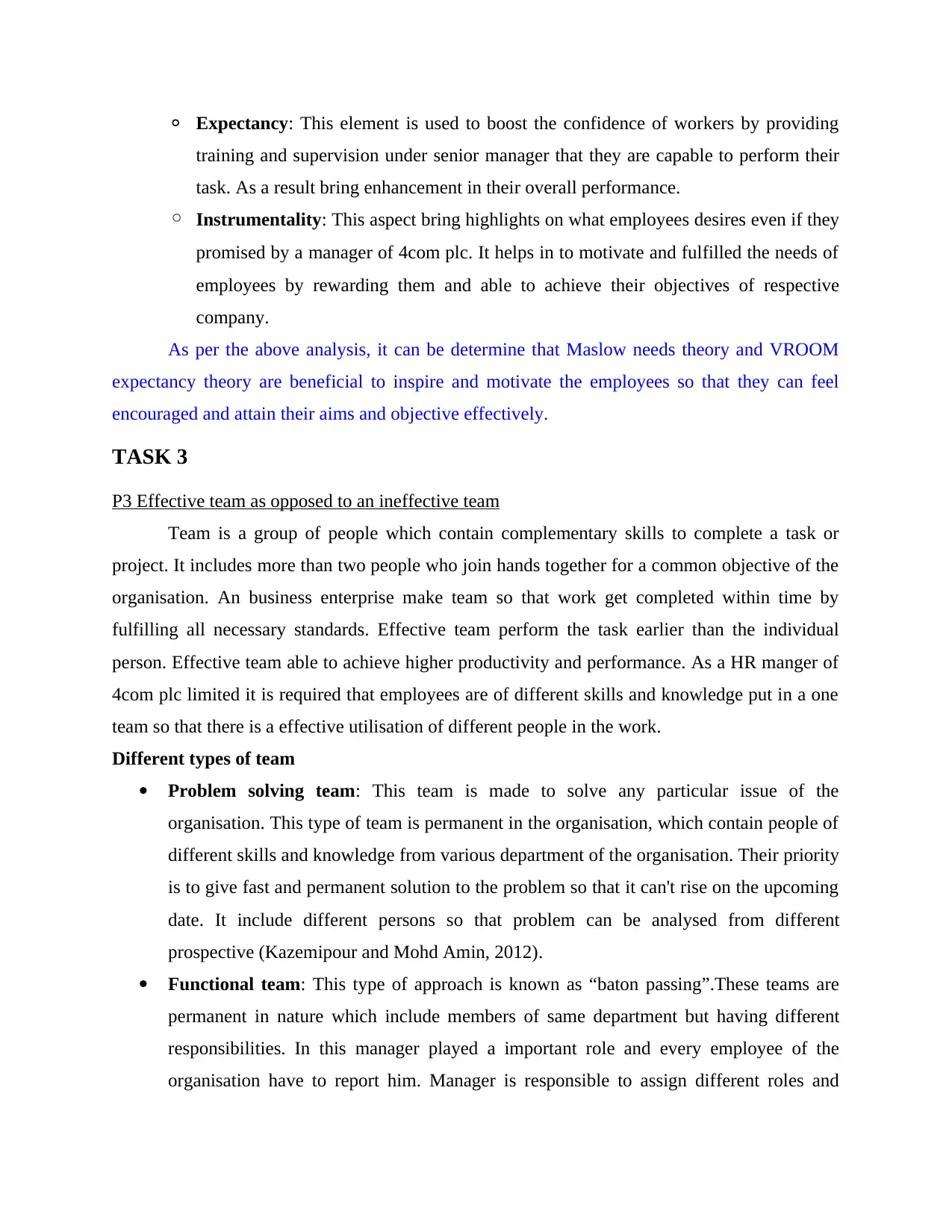
◦ Expectancy: This element is used to boost the confidence of workers by providing
training and supervision under senior manager that they are capable to perform their
task. As a result bring enhancement in their overall performance.
◦ Instrumentality: This aspect bring highlights on what employees desires even if they
promised by a manager of 4com plc. It helps in to motivate and fulfilled the needs of
employees by rewarding them and able to achieve their objectives of respective
company.
As per the above analysis, it can be determine that Maslow needs theory and VROOM
expectancy theory are beneficial to inspire and motivate the employees so that they can feel
encouraged and attain their aims and objective effectively.
TASK 3
P3 Effective team as opposed to an ineffective team
Team is a group of people which contain complementary skills to complete a task or
project. It includes more than two people who join hands together for a common objective of the
organisation. An business enterprise make team so that work get completed within time by
fulfilling all necessary standards. Effective team perform the task earlier than the individual
person. Effective team able to achieve higher productivity and performance. As a HR manger of
4com plc limited it is required that employees are of different skills and knowledge put in a one
team so that there is a effective utilisation of different people in the work.
Different types of team
Problem solving team: This team is made to solve any particular issue of the
organisation. This type of team is permanent in the organisation, which contain people of
different skills and knowledge from various department of the organisation. Their priority
is to give fast and permanent solution to the problem so that it can't rise on the upcoming
date. It include different persons so that problem can be analysed from different
prospective (Kazemipour and Mohd Amin, 2012).
Functional team: This type of approach is known as “baton passing”.These teams are
permanent in nature which include members of same department but having different
responsibilities. In this manager played a important role and every employee of the
organisation have to report him. Manager is responsible to assign different roles and
training and supervision under senior manager that they are capable to perform their
task. As a result bring enhancement in their overall performance.
◦ Instrumentality: This aspect bring highlights on what employees desires even if they
promised by a manager of 4com plc. It helps in to motivate and fulfilled the needs of
employees by rewarding them and able to achieve their objectives of respective
company.
As per the above analysis, it can be determine that Maslow needs theory and VROOM
expectancy theory are beneficial to inspire and motivate the employees so that they can feel
encouraged and attain their aims and objective effectively.
TASK 3
P3 Effective team as opposed to an ineffective team
Team is a group of people which contain complementary skills to complete a task or
project. It includes more than two people who join hands together for a common objective of the
organisation. An business enterprise make team so that work get completed within time by
fulfilling all necessary standards. Effective team perform the task earlier than the individual
person. Effective team able to achieve higher productivity and performance. As a HR manger of
4com plc limited it is required that employees are of different skills and knowledge put in a one
team so that there is a effective utilisation of different people in the work.
Different types of team
Problem solving team: This team is made to solve any particular issue of the
organisation. This type of team is permanent in the organisation, which contain people of
different skills and knowledge from various department of the organisation. Their priority
is to give fast and permanent solution to the problem so that it can't rise on the upcoming
date. It include different persons so that problem can be analysed from different
prospective (Kazemipour and Mohd Amin, 2012).
Functional team: This type of approach is known as “baton passing”.These teams are
permanent in nature which include members of same department but having different
responsibilities. In this manager played a important role and every employee of the
organisation have to report him. Manager is responsible to assign different roles and
⊘ This is a preview!⊘
Do you want full access?
Subscribe today to unlock all pages.

Trusted by 1+ million students worldwide
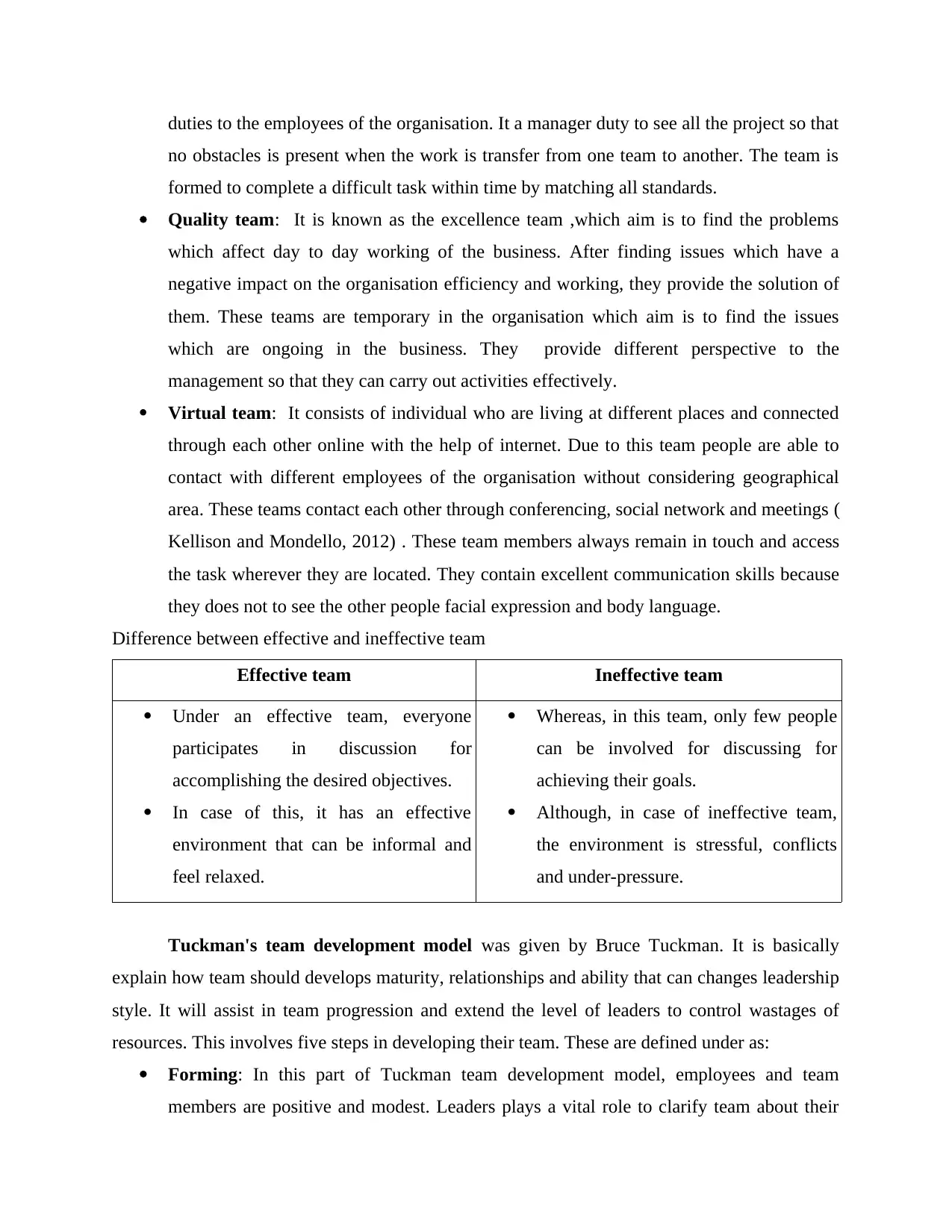
duties to the employees of the organisation. It a manager duty to see all the project so that
no obstacles is present when the work is transfer from one team to another. The team is
formed to complete a difficult task within time by matching all standards.
Quality team: It is known as the excellence team ,which aim is to find the problems
which affect day to day working of the business. After finding issues which have a
negative impact on the organisation efficiency and working, they provide the solution of
them. These teams are temporary in the organisation which aim is to find the issues
which are ongoing in the business. They provide different perspective to the
management so that they can carry out activities effectively.
Virtual team: It consists of individual who are living at different places and connected
through each other online with the help of internet. Due to this team people are able to
contact with different employees of the organisation without considering geographical
area. These teams contact each other through conferencing, social network and meetings (
Kellison and Mondello, 2012) . These team members always remain in touch and access
the task wherever they are located. They contain excellent communication skills because
they does not to see the other people facial expression and body language.
Difference between effective and ineffective team
Effective team Ineffective team
Under an effective team, everyone
participates in discussion for
accomplishing the desired objectives.
In case of this, it has an effective
environment that can be informal and
feel relaxed.
Whereas, in this team, only few people
can be involved for discussing for
achieving their goals.
Although, in case of ineffective team,
the environment is stressful, conflicts
and under-pressure.
Tuckman's team development model was given by Bruce Tuckman. It is basically
explain how team should develops maturity, relationships and ability that can changes leadership
style. It will assist in team progression and extend the level of leaders to control wastages of
resources. This involves five steps in developing their team. These are defined under as:
Forming: In this part of Tuckman team development model, employees and team
members are positive and modest. Leaders plays a vital role to clarify team about their
no obstacles is present when the work is transfer from one team to another. The team is
formed to complete a difficult task within time by matching all standards.
Quality team: It is known as the excellence team ,which aim is to find the problems
which affect day to day working of the business. After finding issues which have a
negative impact on the organisation efficiency and working, they provide the solution of
them. These teams are temporary in the organisation which aim is to find the issues
which are ongoing in the business. They provide different perspective to the
management so that they can carry out activities effectively.
Virtual team: It consists of individual who are living at different places and connected
through each other online with the help of internet. Due to this team people are able to
contact with different employees of the organisation without considering geographical
area. These teams contact each other through conferencing, social network and meetings (
Kellison and Mondello, 2012) . These team members always remain in touch and access
the task wherever they are located. They contain excellent communication skills because
they does not to see the other people facial expression and body language.
Difference between effective and ineffective team
Effective team Ineffective team
Under an effective team, everyone
participates in discussion for
accomplishing the desired objectives.
In case of this, it has an effective
environment that can be informal and
feel relaxed.
Whereas, in this team, only few people
can be involved for discussing for
achieving their goals.
Although, in case of ineffective team,
the environment is stressful, conflicts
and under-pressure.
Tuckman's team development model was given by Bruce Tuckman. It is basically
explain how team should develops maturity, relationships and ability that can changes leadership
style. It will assist in team progression and extend the level of leaders to control wastages of
resources. This involves five steps in developing their team. These are defined under as:
Forming: In this part of Tuckman team development model, employees and team
members are positive and modest. Leaders plays a vital role to clarify team about their
Paraphrase This Document
Need a fresh take? Get an instant paraphrase of this document with our AI Paraphraser
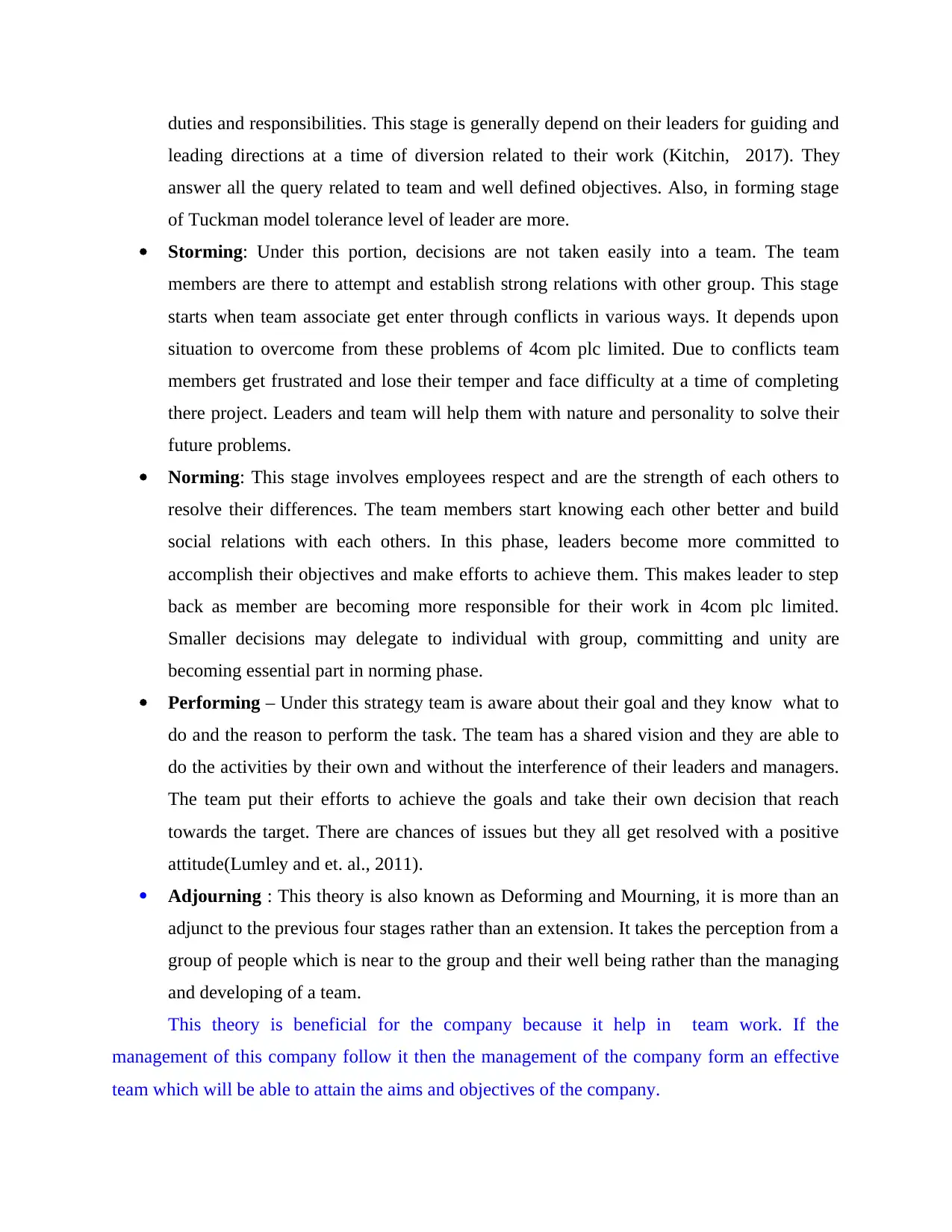
duties and responsibilities. This stage is generally depend on their leaders for guiding and
leading directions at a time of diversion related to their work (Kitchin, 2017). They
answer all the query related to team and well defined objectives. Also, in forming stage
of Tuckman model tolerance level of leader are more.
Storming: Under this portion, decisions are not taken easily into a team. The team
members are there to attempt and establish strong relations with other group. This stage
starts when team associate get enter through conflicts in various ways. It depends upon
situation to overcome from these problems of 4com plc limited. Due to conflicts team
members get frustrated and lose their temper and face difficulty at a time of completing
there project. Leaders and team will help them with nature and personality to solve their
future problems.
Norming: This stage involves employees respect and are the strength of each others to
resolve their differences. The team members start knowing each other better and build
social relations with each others. In this phase, leaders become more committed to
accomplish their objectives and make efforts to achieve them. This makes leader to step
back as member are becoming more responsible for their work in 4com plc limited.
Smaller decisions may delegate to individual with group, committing and unity are
becoming essential part in norming phase.
Performing – Under this strategy team is aware about their goal and they know what to
do and the reason to perform the task. The team has a shared vision and they are able to
do the activities by their own and without the interference of their leaders and managers.
The team put their efforts to achieve the goals and take their own decision that reach
towards the target. There are chances of issues but they all get resolved with a positive
attitude(Lumley and et. al., 2011).
Adjourning : This theory is also known as Deforming and Mourning, it is more than an
adjunct to the previous four stages rather than an extension. It takes the perception from a
group of people which is near to the group and their well being rather than the managing
and developing of a team.
This theory is beneficial for the company because it help in team work. If the
management of this company follow it then the management of the company form an effective
team which will be able to attain the aims and objectives of the company.
leading directions at a time of diversion related to their work (Kitchin, 2017). They
answer all the query related to team and well defined objectives. Also, in forming stage
of Tuckman model tolerance level of leader are more.
Storming: Under this portion, decisions are not taken easily into a team. The team
members are there to attempt and establish strong relations with other group. This stage
starts when team associate get enter through conflicts in various ways. It depends upon
situation to overcome from these problems of 4com plc limited. Due to conflicts team
members get frustrated and lose their temper and face difficulty at a time of completing
there project. Leaders and team will help them with nature and personality to solve their
future problems.
Norming: This stage involves employees respect and are the strength of each others to
resolve their differences. The team members start knowing each other better and build
social relations with each others. In this phase, leaders become more committed to
accomplish their objectives and make efforts to achieve them. This makes leader to step
back as member are becoming more responsible for their work in 4com plc limited.
Smaller decisions may delegate to individual with group, committing and unity are
becoming essential part in norming phase.
Performing – Under this strategy team is aware about their goal and they know what to
do and the reason to perform the task. The team has a shared vision and they are able to
do the activities by their own and without the interference of their leaders and managers.
The team put their efforts to achieve the goals and take their own decision that reach
towards the target. There are chances of issues but they all get resolved with a positive
attitude(Lumley and et. al., 2011).
Adjourning : This theory is also known as Deforming and Mourning, it is more than an
adjunct to the previous four stages rather than an extension. It takes the perception from a
group of people which is near to the group and their well being rather than the managing
and developing of a team.
This theory is beneficial for the company because it help in team work. If the
management of this company follow it then the management of the company form an effective
team which will be able to attain the aims and objectives of the company.
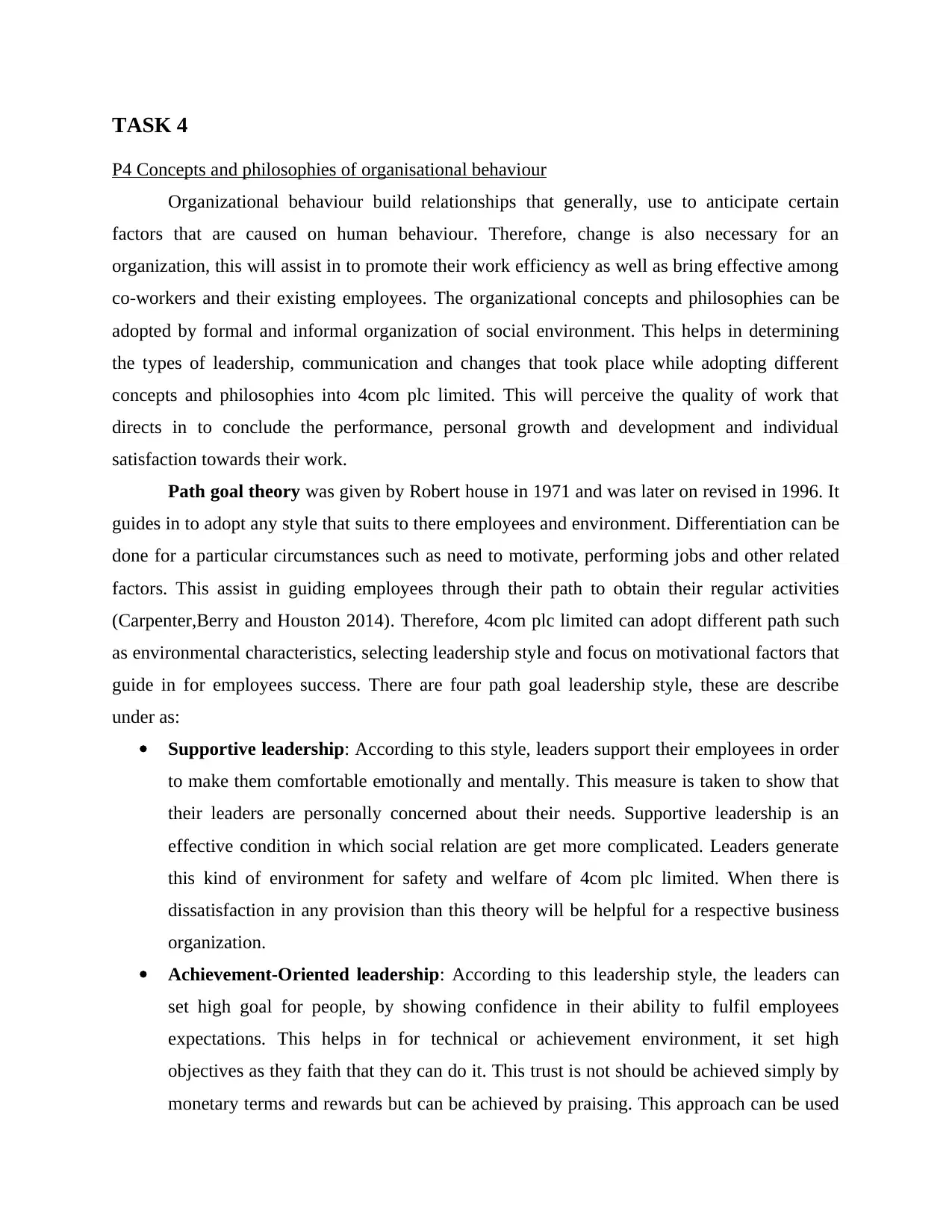
TASK 4
P4 Concepts and philosophies of organisational behaviour
Organizational behaviour build relationships that generally, use to anticipate certain
factors that are caused on human behaviour. Therefore, change is also necessary for an
organization, this will assist in to promote their work efficiency as well as bring effective among
co-workers and their existing employees. The organizational concepts and philosophies can be
adopted by formal and informal organization of social environment. This helps in determining
the types of leadership, communication and changes that took place while adopting different
concepts and philosophies into 4com plc limited. This will perceive the quality of work that
directs in to conclude the performance, personal growth and development and individual
satisfaction towards their work.
Path goal theory was given by Robert house in 1971 and was later on revised in 1996. It
guides in to adopt any style that suits to there employees and environment. Differentiation can be
done for a particular circumstances such as need to motivate, performing jobs and other related
factors. This assist in guiding employees through their path to obtain their regular activities
(Carpenter,Berry and Houston 2014). Therefore, 4com plc limited can adopt different path such
as environmental characteristics, selecting leadership style and focus on motivational factors that
guide in for employees success. There are four path goal leadership style, these are describe
under as:
Supportive leadership: According to this style, leaders support their employees in order
to make them comfortable emotionally and mentally. This measure is taken to show that
their leaders are personally concerned about their needs. Supportive leadership is an
effective condition in which social relation are get more complicated. Leaders generate
this kind of environment for safety and welfare of 4com plc limited. When there is
dissatisfaction in any provision than this theory will be helpful for a respective business
organization.
Achievement-Oriented leadership: According to this leadership style, the leaders can
set high goal for people, by showing confidence in their ability to fulfil employees
expectations. This helps in for technical or achievement environment, it set high
objectives as they faith that they can do it. This trust is not should be achieved simply by
monetary terms and rewards but can be achieved by praising. This approach can be used
P4 Concepts and philosophies of organisational behaviour
Organizational behaviour build relationships that generally, use to anticipate certain
factors that are caused on human behaviour. Therefore, change is also necessary for an
organization, this will assist in to promote their work efficiency as well as bring effective among
co-workers and their existing employees. The organizational concepts and philosophies can be
adopted by formal and informal organization of social environment. This helps in determining
the types of leadership, communication and changes that took place while adopting different
concepts and philosophies into 4com plc limited. This will perceive the quality of work that
directs in to conclude the performance, personal growth and development and individual
satisfaction towards their work.
Path goal theory was given by Robert house in 1971 and was later on revised in 1996. It
guides in to adopt any style that suits to there employees and environment. Differentiation can be
done for a particular circumstances such as need to motivate, performing jobs and other related
factors. This assist in guiding employees through their path to obtain their regular activities
(Carpenter,Berry and Houston 2014). Therefore, 4com plc limited can adopt different path such
as environmental characteristics, selecting leadership style and focus on motivational factors that
guide in for employees success. There are four path goal leadership style, these are describe
under as:
Supportive leadership: According to this style, leaders support their employees in order
to make them comfortable emotionally and mentally. This measure is taken to show that
their leaders are personally concerned about their needs. Supportive leadership is an
effective condition in which social relation are get more complicated. Leaders generate
this kind of environment for safety and welfare of 4com plc limited. When there is
dissatisfaction in any provision than this theory will be helpful for a respective business
organization.
Achievement-Oriented leadership: According to this leadership style, the leaders can
set high goal for people, by showing confidence in their ability to fulfil employees
expectations. This helps in for technical or achievement environment, it set high
objectives as they faith that they can do it. This trust is not should be achieved simply by
monetary terms and rewards but can be achieved by praising. This approach can be used
⊘ This is a preview!⊘
Do you want full access?
Subscribe today to unlock all pages.

Trusted by 1+ million students worldwide
1 out of 15
Related Documents
Your All-in-One AI-Powered Toolkit for Academic Success.
+13062052269
info@desklib.com
Available 24*7 on WhatsApp / Email
![[object Object]](/_next/static/media/star-bottom.7253800d.svg)
Unlock your academic potential
Copyright © 2020–2026 A2Z Services. All Rights Reserved. Developed and managed by ZUCOL.





